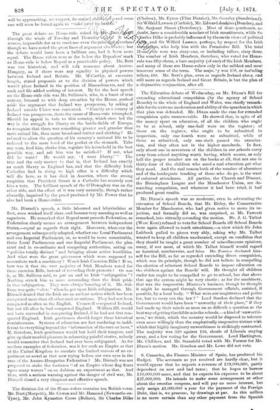Mr. Dixon's speech was so moderate, even in advocating the
extension of School Boards, that Mr. Birley, the Conservative Member for Manchester, who had given notice to move its re- jection, and formally did so, was surprised, as Mr. Fawcett remarked, into virtually seconding the motion. Mr. J. G. Talbot (West Kent) refused to vote for School Boards till School Boards were again allowed to teach catechisms,—a view which Sir John Lubbock pulled to pieces very ably, asking why Mr. Talbot wanted to keep all children uneducated, except on condition that they should be taught a great number of miscellaneous opinions, many, if not most, of which Mr. Talbot himself would regard as heretical, mischievous, and falso. Mr. Forster declared him- self for the Bill, as far as regarded extending direct compulsion, which was its principle, though he did not believe in compelling the election of reluctant School Boards to impose education on the ohildren against the Boards' will. He thought all children under ten ought to be compelled to go to school, but that above that age the system might be very elastic ; as for the machinery, that was the responsible Minister's business, though he thought it might be managed through Government officials, assisted, if possible, by a local body. "What were our magistrates and police for, but to carry out the law ? " Lord Sandon declared that the Government would have been "unworthy of their place," if they had made up their minds so soon on so difficult a question as the best way of getting th e chil dren to the schools, —a kind of 'unworthi- ness,' we think, which the country would be disposed to tolerate even more willingly than the emphatically iuspensive virtues with which that highly imaginary unworthiness is strikingly contrasted. The majority was 320 against 156, shoals of Liberals staying away, and a few voting for the Government. Lord Hartington, Mr. Childers, and Mr. Stansfeld voted with Mr. Forster for Mr. Dixon's motion. Mr. Goschen and Mr. Lowe did not vote.


































 Previous page
Previous page